AI can detect cancer in coughs. Don’t believe it? The World Health Organization is promoting it globally

China's AI technology has been featured in the United Nations!
The AI for Good Summit is the United Nations' flagship summit in the field of AI. This year, UN Secretary-General Guterres, Hinton, one of the "three giants of deep learning", and OpenAI CEO Altman all attended the summit.
At such an event, a video of a Chinese female patient playing the harmonica attracted the attention of the entire audience. She is the world's first beneficiary of AI pancreatic cancer early screening technology.
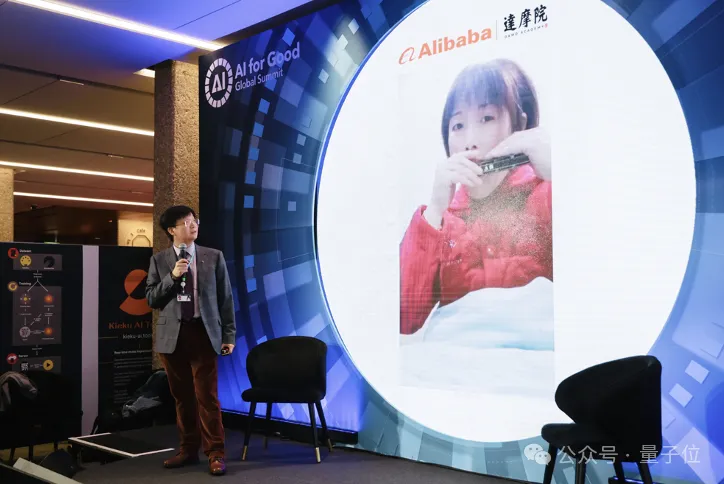
The speaker was Dr. Lu Le, head of the medical AI team at Alibaba DAMO Academy and IEEE Fellow. The AI multi-cancer screening technology proposed by the team in collaboration with several Chinese oncologists has won international acclaim. The top international journal Nature Medicine published a special commentary titled "Opening the Golden Age of Cancer Screening", and Stanford University's 2024 AI Index Report listed it as a highlight of global AI research, which is also the only work from China.
At the AI for Good Summit, the World Health Organization (WHO) Digital Health Collaborating Center announced a partnership with the DAMO Academy to promote this Chinese AI technology globally to benefit more developing countries.
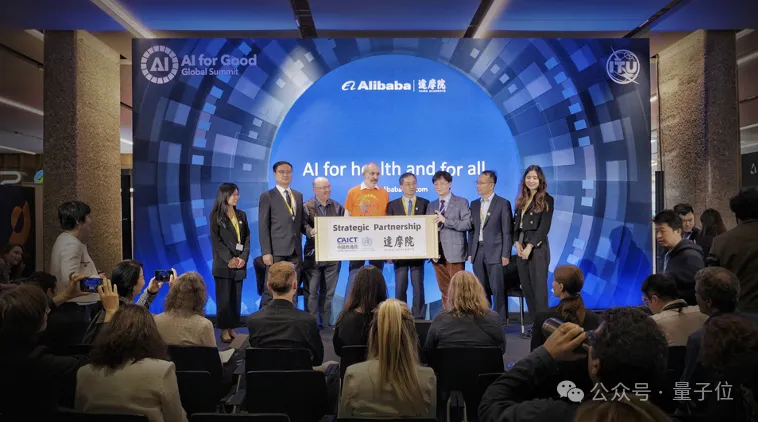
AI identifies pancreatic cancer in coughing patients
The female patient was from Qidong, Jiangsu. In April 2023, she underwent a chest plain scan CT scan at the respiratory outpatient clinic of a tertiary hospital in Shanghai due to cough. The diagnosis report at the time was "no obvious abnormalities were found, and there may be a little inflammation around the tail of the pancreatic corpuscle."
The coughing stopped soon and she didn't take it too seriously.
But not long after, she suddenly received a follow-up call from the doctor: "You should pay attention to this. It would be best if you can get an enhanced CT scan of the upper abdomen."
The reason is that her CT images were included in the "plain scan CT + AI" cancer early screening project led by the DAMO Academy. In a retrospective trial of more than 20,000 real cases, she was identified by AI as suspected early pancreatic cancer.
She then returned to the hospital for a pancreatic MR plain scan + enhanced CT scan. The results showed that the AI's judgment was correct: there was a mass in the tail of the pancreas, with mild enhancement after enhancement, and the size was about 25×31mm.
After the examination results were finalized, the hospital arranged a radical pancreatic tail resection for her. She was discharged from the hospital just five days after the operation. Now more than a year has passed since the operation, Ms. Huang is in good health and has not experienced recurrence or metastasis.
The attending physician said that the plain scan CT images commonly used in hospitals have low contrast, and without AI recognition, it is difficult to detect early pancreatic cancer from plain scan CT.
Pancreatic cancer is one of the malignant tumors with the lowest survival rate in the world, mainly because it is often discovered in the late stages and early detection is too difficult. Current clinical guidelines lack effective early screening methods.
From being questioned to appearing at the United Nations
Cancer is one of the most important public health issues in the world. According to WHO research data, one-third of cancers can be cured through early detection, early diagnosis and early treatment.
But the problem is that it is not easy to screen for cancer in large numbers of asymptomatic people.
Taking "blood test for cancer", one of the mainstream research directions in Europe and the United States, as an example, this screening method, which captures ctDNA fragments of tumor tissue in the blood, has various problems such as poor capture ability, low detection rate, poor generalization performance due to individual differences, and excessively high prices.
Faced with such challenges, researchers at DAMO Academy who focus on AI medical research were the first to think of using AI technology to make use of ordinary CT scans, which are widely used in various outpatient clinics and physical examinations, to quickly identify lesions and achieve early cancer screening.
Therefore, in collaboration with more than a dozen hospitals around the world, DAMO Academy built a pancreatic cancer detection model PANDA based on this concept: using deep learning technology to observe tiny density differences in low-contrast plain scan CT images, and then effectively detect cancer lesions.
The paper was published in Nature Medicine and attracted wide attention, with 64,000 page views. Because of the amazing effect of the model, 31 clinically missed lesions were found in a retrospective trial of more than 20,000 real cases, of which 2 patients with early pancreatic cancer were cured.
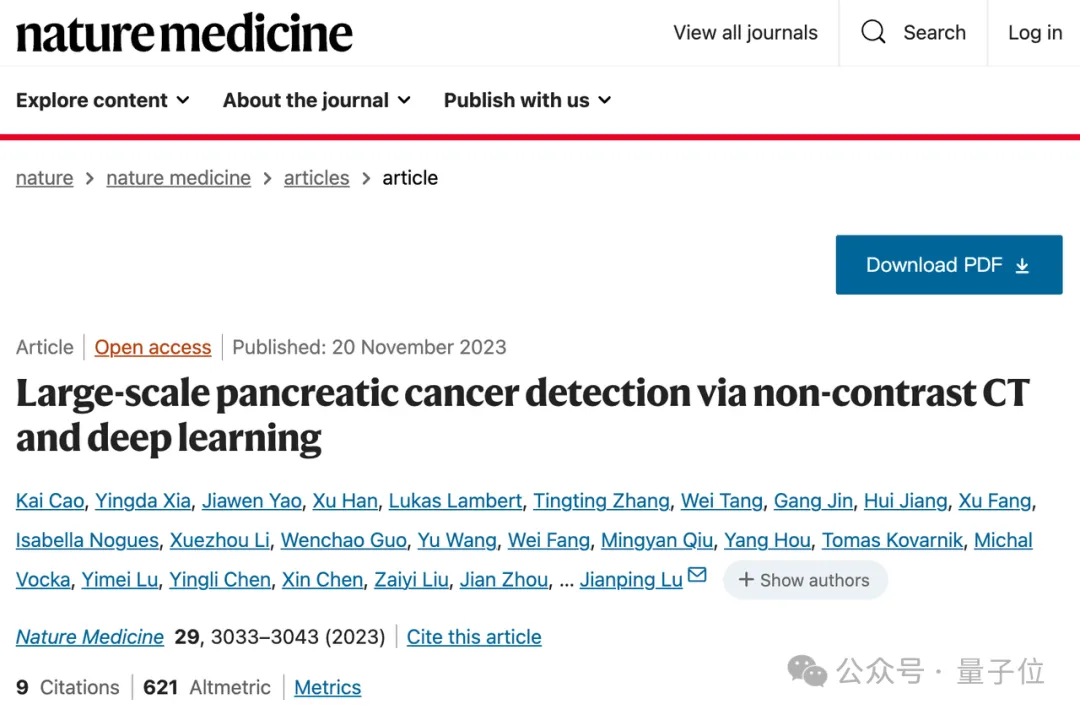
The paper mentioned that PANDA's accuracy in detecting early pancreatic cancer and small lesions exceeded that of human radiologists. In multicenter validation, PANDA's lesion detection AUC was 0.986-0.996, which was 34.1% higher in sensitivity and 6.3% higher in specificity than the average performance of radiologists.
In addition, PANDA also showed generalizability in the identification of other cancer lesions.
Such data means that PANDA has confirmed for the first time the feasibility of using AI for pancreatic cancer screening on plain scan CT, and has achieved high performance that was previously thought to be unattainable. It is a new tool for large-scale cancer screening with great potential.
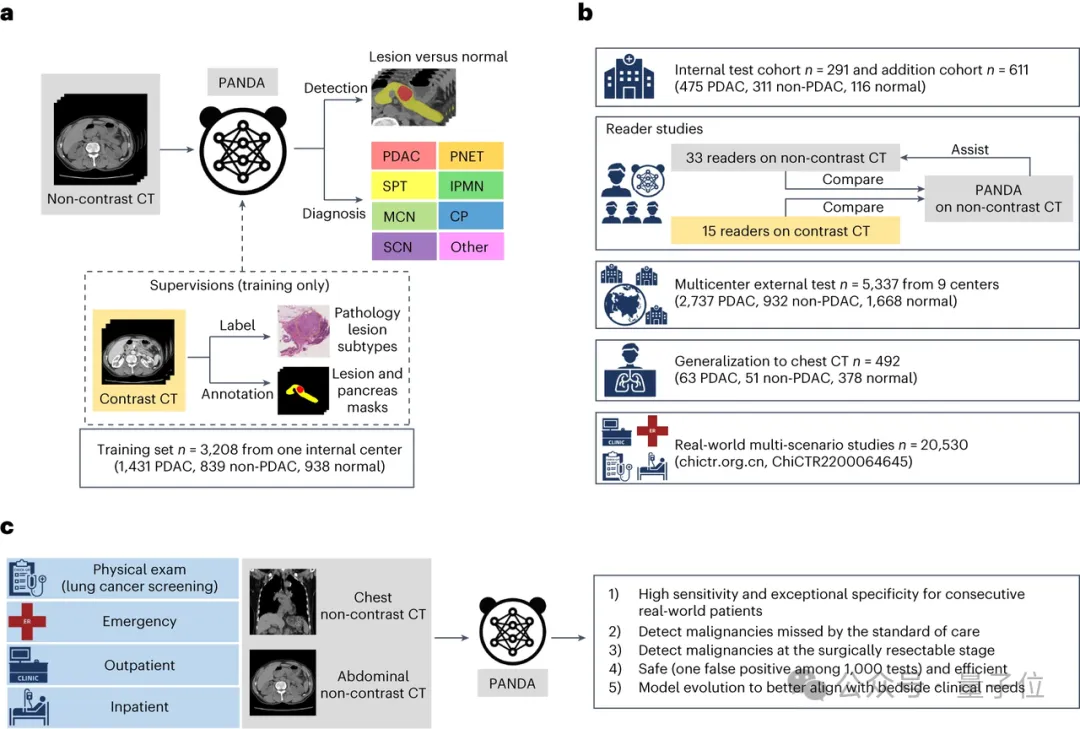
But such innovations were not widely accepted at the beginning.
Not to mention promotion, even publishing the paper was difficult. It took as long as 8 months from Received to Accepted, and the reviewers asked 58 consecutive questions, including Jörg Kleeff, a top pancreatic cancer expert in the world and a German professor.
Another Dutch medical expert also raised questions to Lu Le in person: his team has been working in this field for 35 years and has not been able to achieve the research results given by PANDA, so he expressed doubts about this technology.
To this end, Lu Le's team created a demo on Alibaba Cloud's Frankfurt node, allowing overseas experts to use their own data to actually test this artificial intelligence cancer screening system and eliminate doubts.
最终,Jörg Kleeff教授被论文及其补充材料所折服:“结果相当出色,可能会显著改变我们对于胰腺癌筛查的方法”,向《自然·医学》编辑部强烈建议论文发表。他还为《自然·医学》撰写评论文章《基于医疗影像AI的癌症筛查即将进入黄金时代》。
From pancreatic cancer to early screening of multiple cancers, from experiment to implementation
After developing the PANDA model, DAMO Academy did not stop but instead accelerated its pace, moving from early screening for pancreatic cancer to multiple cancers.
They are working with many of the world's top medical institutions to explore medical AI products that can detect multiple cancers (pancreatic cancer, esophageal cancer, liver cancer, lung cancer, colorectal cancer, gastric cancer, breast cancer, lymphatic abnormalities) or chronic diseases (cardiovascular disease, aortic syndrome, osteoporosis, fatty liver, etc.) through a single plain CT scan.
These studies are being implemented at an accelerated pace. In China, relying on Alibaba's medical AI multi-cancer early screening charity project, DAMO Academy AI was first deployed in Lishui Central Hospital and Jingning County People's Hospital, assisting doctors in screening and diagnosing various diseases through the "plain scan CT + AI" method.
Abroad, the Caribbean country of Antigua and Barbuda took the initiative to extend an olive branch to the Dharma Academy. Witnessed by the country's Prime Minister, the country's Ministry of Health and the Dharma Academy officially signed a contract.
This time, the World Health Organization (WHO) has set its sights on this technology and will strengthen its cooperation with the DAMO Academy in terms of channels, markets, implementation, technology, and standards, so that more developing countries and regions with uneven medical resources can share this cutting-edge achievement and join forces in the global fight against cancer.
Why has it gone from being questioned to being internationally sought after? One of the key reasons is that DAMO Academy's AI multi-cancer early screening technology is only theoretical, but also highly practical .
Alan Yuille, IEEE Fellow and Professor at Johns Hopkins University, commented on this research:
Current medical AI systems generally perform well under balanced training samples, but when applied to real environments, there are often domain gaps (Domain Group) . PANDA's real-world verification and iteration model allows it to maintain very high specificity and demonstrate robust performance.
The accessibility of technology is also a major reason. According to estimates, screening for seven major cancers usually requires a series of traditional examinations such as gastrointestinal endoscopy, enhanced CT, and ultrasound, which cost at least 3,000 yuan . However, the one-scan, multiple-check technology based on plain scan CT + AI only costs about 200 yuan , which effectively improves the early cancer detection rate without bringing additional financial and physical burdens to patients.
“Using AI to solve real clinical needs”
In fact, DAMO Academy started AI+medical research very early.
At the beginning of the COVID-19 pandemic, the DAMO Academy urgently developed an AI-assisted diagnosis system for COVID-19 using CT images, which was used in more than 600 hospitals in China and analyzed more than 800,000 cases. It was named a national advanced collective in science and technology for the fight against the epidemic.
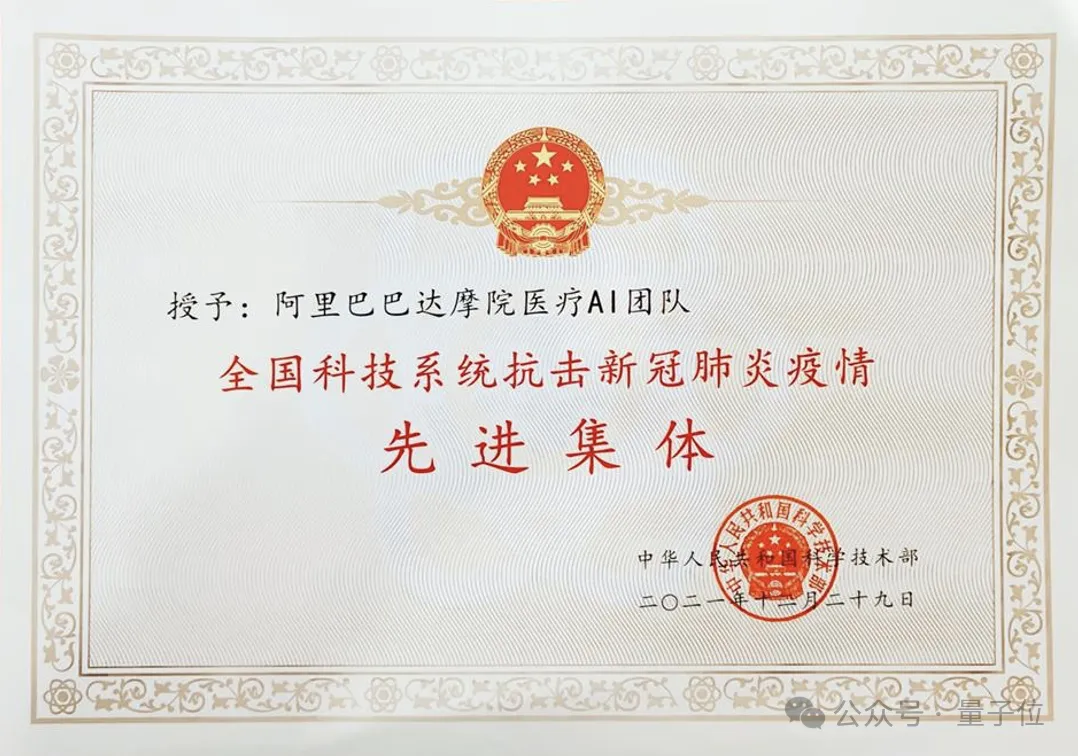
This is related to the original intention of the establishment of DAMO Academy. Jack Ma once said that DAMO Academy should become a corporate research institute that is oriented to the future and uses technology to solve major social problems.
As the head of the DAMO Academy's medical AI team, IEEE Fellow Lu Le is also clear about the first principles of technology:
AI should solve clinical needs that have not yet been met but are truly needed by patients. We need to make indispensable contributions to clinical problems related to patients' lives.
At present, the DAMO Academy Medical AI team focuses on the entire process of precision cancer treatment with medical image AI as the core. It has developed a full-process cancer diagnosis and treatment technology including large-scale screening, precision diagnosis, prognostic treatment, and response evaluation. It has made phased progress in the identification and screening of high-incidence cancers such as pancreatic cancer, esophageal cancer, lung cancer, breast cancer, liver cancer, gastric cancer, and colorectal cancer. The research has been published in journals such as Nature Communications and Nature Medicine, and AI top conferences such as CVPR, MICCAI, and IPMI, including:
In October 2022, based on deep learning, 42 critical organs of head and neck cancer were efficiently and accurately delineated, which can effectively reduce complications of radiotherapy. The relevant paper was published in Nature Communications and was also rated as a representative algorithm of Chinese medical artificial intelligence.
In June 2023, in response to the OOD (out-of-distribution detection) problem in the field of vision, the DAMO Academy proposed a new medical image semantic segmentation framework that enables AI to more accurately identify difficult and rare cases in tumors. The framework has been verified on pancreatic and liver tumors and was rated as a Highlight paper by CVPR 2023, the top international conference on computer vision.
In August 2023, CancerUniT, a universal model for multi-cancer image analysis, was released. With the help of enhanced CT, it can assist in the diagnosis of eight mainstream cancers. The paper results of this model were included in the top computer vision conference ICCV 2023.
In the same month, the first continuous deep learning framework that can segment 143 organs throughout the body was released, and the results were included in ICCV 2023.
……
The DAMO Academy has also established deep clinical and scientific research cooperation relationships with many large tertiary hospitals, such as Zhejiang University First Hospital, Fudan Cancer Hospital, and Shengjing Hospital. Its medical AI products have been successfully connected and implemented with more than 30 medical imaging partners, with a total of more than 1,000 medical institutions, providing early screening services for multiple cancers for more than 6 million people worldwide.
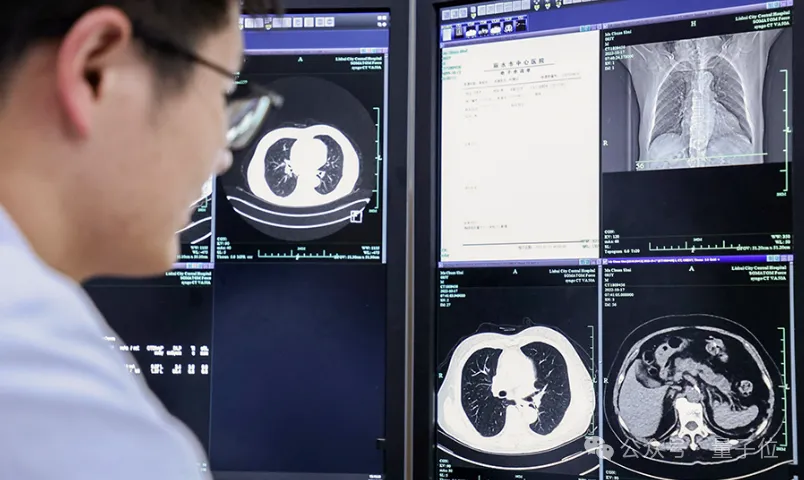
AI is sweeping the world, and the world is changing as a result.
Perhaps more importantly for the general public, these AI technology innovations are beginning to have a real and positive impact on the lives of ordinary people.
AI for Good, AI for All, this is the value of technological development.
This time, Chinese scientific research forces such as the DAMO Academy are not absent, and are constantly attracting the world's attention with their achievements.
Reference link: https://www.nature.com/articles/s41591-023-02640-w.